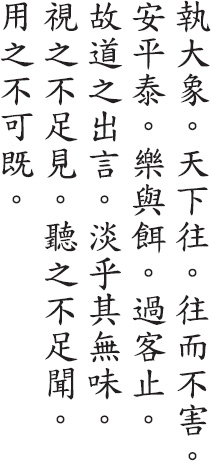35
 |
Hold up the Great Image and the world will come and be beyond harm safe and serene and at peace fine food and song don’t detain guests long thus the Tao speaks plain words that make no sense we look but don’t see it we listen but don’t hear it yet we use it without end |
CH’ENG HSUAN-YING says, “Here ‘hold’ means to hold without holding, to hold what cannot be held.”
HUANG YUAN-CHI says, “The Great Image is the Great Way, which gives birth to Heaven and Earth and all creatures. It is called ‘great’ because it encompasses everything.”
LI JUNG says, “The Great Image has no form. What has no form is the great and empty Way. To ‘hold’ means to focus or to keep. Those who can keep their body in the realm of Dark Virtue and focus their mind on the gate of Hidden Serenity possess the Way. All things come to them. Clouds appear, and all creatures are refreshed. Rain pours down, and all plants are nourished. And these blessings come from such a subtle thing.”
WU CH’ENG says, “To come to no harm means to be protected. But when people turn to sages, sages use no protection to protect them. If they protected people with protection, protection and harm would both exist. But by protecting people with no protection, people are always protected and kept from harm.”
LU TUNG-PIN says, “Unharmed, our spirit is safe. Unharmed, our breath is serene. Unharmed, our nature is at peace.”
TE-CH’ING says, “Sages rule the world through selflessness. All things come to them because they are one with all things. And while they forget themselves in others, others forget themselves in them. Thus, all things find their place, and there are none that are not at peace.”
CHANG TAO-LING says, “What the Tao says is the opposite of the mundane or the clever. Most people find it completely senseless. But within its senselessness, there is great sense. This is what sages savor. The Tao prefers simplicity of form and a minimum of expression. Hence, it is hard to see and hard to hear and also hard to follow. But those who can follow it and use it enjoy limitless blessings.”
CHUANG-TZU says, “A great person’s words are plain like water. A small person’s words are sweet like wine. The plainness of a great person brings people closer, while the sweetness of a small person drives them apart. Those who come together for no reason, separate for no reason” (Chuangtzu: 20.5).
SU CH’E says, “Banquets and entertainment might detain visitors, but sooner or later the food runs out, the music ends, and visitors leave. If someone entertained the world with the Great Image, no one would know how to love it, much less hate it. Although it has no taste, shape, or sound with which to please people, those who use it can never exhaust it.”
HO-SHANG KUNG says, “If someone used the Tao to govern the country, the country would be rich, and the people would be prosperous. If someone used it to cultivate themselves, there would be no limit to the length of their life.”
The Great Image is Te, or Virtue, the manifestation of the Tao. I have followed the Kuotien and Mawangtui texts in adding ku (thus) to line seven. Lines nine and ten are also echoed in verse 14: “We look but don’t see it / and call it indistinct / we listen but don’t hear it / and call it faint.”